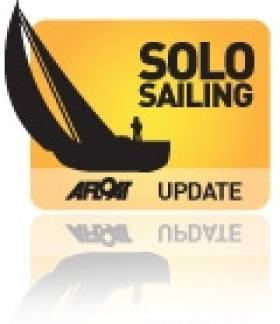Displaying items by tag: Solo Maître Coq
Kenefick Starts Solo Season with Solo Maître Coq Race
#fullirish – Sailing out of the iconic Vendée Globe canal in Les Sables d'Olonne, France today, Irish sailor of the year David Kenefick had a poor start to his first race of the 2014 season but there is still all to play for as the Royal Cork sailor embarks on a 270-–miler tonight. He gave a podcast on his preparations here.
Kenefick, the only Irish sailor competing, was along side eight British skippers; Artemis Offshore Academy Rookies Rich Mason (Artemis 77), Alan Roberts (Artemis 23), Sam Matson (Artemis 21) and graduates Jack Bouttell (Overboard), Ed Hill (Macmillan Cancer Support), Henry Bomby (Black Mamba) and Sam Goodchild (Team Plymouth) and Phil Sharp (Phil Sharp Racing) – kick started their 2014 solo Figaro season with the Solo Maître Coq. Due to the extremely light winds forecast for the duration of the race, the organisers made the decision to shorten the 320 mile course by 50 miles: "It's going to be a difficult race as there is next to no wind forecast for the duration," explained Jack, who has had just nine days since taking over his Figaro to sail to Les Sables d'Olonne for the race. "Originally looping between Île d'Ré and Belle Île, the course instead sees the fleet sail a figure of eight from Les Sable d'Olonne north to Île d'Yeu and back, and then south to Île de Ré and back – passing Les Sables three times on route. The new course means organisers can easily shorten the race further if necessary."
Sun cream and sunglasses on, the 38 boat Solo Maître Coq fleet crossed start line at the third attempt just after 1130GMT, light winds of around 6 knots saw the Figaros drifting early over the line early resulting in two general recalls. Coming into the line on what was to be the actual start, Macmillan skipper Ed 'nailed' a perfect pin end start. At the other extreme, Sam Goodchild, who races into his fourth Figaro season, was biding his time on the 'right' to ensure he was the closet boat to the committee boat. New kids on the block Rich and Alan got their Figaro racing careers off to a fine start, their high-level dinghy racing experience puts a sting in their sterns, forcing double Solitaire du Figaro winner Yann Elies to shadow them all the way to the windward mark. Event Coach Marcus Hutchinson reports: "As ever there were big differences of opinion as to which side of the long first upwind leg would be the place to be. Ed was hell bent on the left and Sam and Jack were super keen on the right. Alan and Rich, perhaps being more conservative, choose to start in the middle of the line – both going really well with speed in their own space. Both sailors quickly pulled out into strong positions halfway up the beat."
Marcus continued: "Sam and Jack got what they wanted on the right, but realised after about 10 minutes that in fact the left hand side close to the shore seemed to have better pressure and chose their moments to move back across the course before any rot could set in. On the left and following a strong start, Ed sailed well and his choice paid off with the reward of a sixth place rounding at the top mark, followed by a relieved Sam Goodchild in 14th, Alan in 19th, Rich 23rd, Henry 32nd, Jack 33rd and Sam Matson 34th."
Popping their spinnakers on the first turning mark, the fleet set off on a long and drawn out run in the sun towards the mark at Île d'Yeu. With top boat speeds of around 5 knots the fleet's ETA at the island, just 35 miles away, is midnight tonight. Although not physically demanding, the light conditions of the Solo Maître Coq will take it's toll on the skippers concentration and morale, especially when drifting past Les Sables d'Olonne again tomorrow near to where the finish line will be – a course change described by Sam Goodchild as 'torturous'. Prior to the race, 2014 British Rookie Rich outlined what he thinks the biggest challenges presented by the Solo Maître Coq will be: "The forecast for the majority of the race is under five knots, which means concentration and mental endurance is going to play a big part in where we finish. We'll be looking out for any little gust of wind, and trimming, trimming, trimming our sails all the time. I'm not expecting to sleep much during the race and some of the skippers reckon we'll be weighing anchor with a total drop off forecast for tonight. Mentally, it's going to be a really tough race."
Experienced French solo skippers Thierry Chabagny (Gedimat), Gildhas Mahé (Interface Concept) and Fabien Delahaye (Macif) currently lead the fleet to Île d'Yeu, with Ed (Macmillan Cancer Support) in 4th and Rich (Artemis 77) heading up the Rookie fleet, with Alan (Artemis 23) not far behind. The 270 mile Solo Maître Coq is expected to take around 35 hours to complete, with skippers finishing Saturday 15th March ahead of the prize giving and RBS Six Nations finals all on the same day.
























































